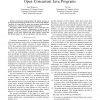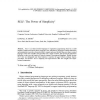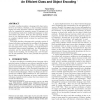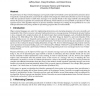134
click to vote
WCRE
2010
IEEE
15 years 13 days ago
2010
IEEE
—Concurrent programming with shared memory in an object-oriented language such as Java is notoriously difficult. Therefore, it is important to study new program understanding te...
154
click to vote
MODELLIERUNG
1998
15 years 3 months ago
1998
In most object-oriented languages and systems, objects must belong to a single most specific class. Relaxing this requirement, also known as role modeling, has been proposed by sev...
139
click to vote
FMOODS
2003
15 years 3 months ago
2003
This paper outlines a sound and complete Hoare logic for a sequential object-oriented language with inheritance and subtyping like Java. It describes a weakest precondition calculu...
121
click to vote
DAGSTUHL
2003
15 years 3 months ago
2003
In this paper we introduce an object-oriented coordination language for multi-agents systems. The beliefs and reasoning capabilities ent are specified in terms of a corresponding ...
OOPSLA
1987
Springer
15 years 5 months ago
1987
Springer
SELF is an object-oriented language for exploratory programming based on a small number of simple and concrete ideas: prototypes, slots, and behavior. Prototypes combine inheritanc...
120
click to vote
PLDI
1995
ACM
15 years 5 months ago
1995
ACM
Dynamic dispatching is a major source of run-time overhead in object-oriented languages, due both to the direct cost of method lookup and to the indirect effect of preventing othe...
111
click to vote
OOPSLA
2000
Springer
15 years 5 months ago
2000
Springer
An object encoding translates a language with object primitives to one without. Similarly, a class encoding translates classes into other primitives. Both are important theoretica...
110
click to vote
FPCA
1989
15 years 6 months ago
1989
Bounded quantification was introduced by Cardelli and Wegner as a means of typing functions that operate uniformly over all subtypes of a given type. They defined a simple “ob...
108
Voted
PEPM
1994
ACM
15 years 6 months ago
1994
ACM
The performance of object-oriented languages can be greatly improved if methods can be specialized for particular classes of arguments. Such specialization can provide the compile...
108
click to vote
ECOOP
1998
Springer
15 years 6 months ago
1998
Springer
Abstract. An object-oriented language that permits changing the behavior of a class or of a single object is said to support computational reflection. Existing reflective facilitie...




